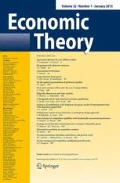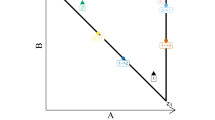Abstract
Most public policies continue in effect until changed, and many are stable for extended periods even though they could be changed at any time. This paper presents a simple approach to characterizing Markov perfect equilibria of dynamic legislative bargaining games with stable policies and durable coalitions. The approach involves satisfying proposer and partner incentive constraints when the coalition is formed and challenger defection and replacement constraints once the coalition has been formed. The approach provides a natural definition of coalition membership and facilitates characterization of the trade-off between internal and external proposal power. Surplus coalitions sacrifice external proposal power for increased internal proposal power, and the coalition size that maximizes proposal power is strictly decreasing in the discount factor and strictly increasing in the majority requirement.
Similar content being viewed by others
Notes
The model considered here differs from that in Baron and Bowen in the proposal strategies, indifference rule, transition rules, structure of the supported set, and the identification of coalition membership. This paper also considers altruistic preferences, relates the equilibria to the simple solutions in Anesi and Seidmann, characterizes maximal proposal power, and characterizes optimal coalition size, none of which is considered in Baron and Bowen.
A proposer does not choose the coalition size. Instead, the dynamic payoffs for proposers are characterized as a function of the coalition size.
An important modeling choice in dynamic legislative bargaining games is specifying how legislators vote when they are indifferent between two policies. Kalandrakis (2004, 2010), Duggan and Kalandrakis (2012), and Bowen and Zahran (2012) assume that legislators vote for a proposal when indifferent between it and the status quo, and Battaglini and Palfrey (2012) assume that legislators vote for the proposal with probability one-half when indifferent. These indifference rules result in Markov perfect equilibria in which policies and their associated coalitions rotate when policies are efficient. The focus here is on equilibria with stable policies and durable coalitions as in Anesi and Seidmann and Baron and Bowen. Baron and Bowen use an indifference rule under which a legislator votes for the status quo when indifferent between it and a proposal, which supports policy stability. The indifference rule used here is that in Anesi and Seidmann.
This is a general property of coalition equilibria for simple majority rule and minimal winning coalitions, as shown in Sect. 5.2.
This is true in general. That is, given \((n,m,u,\delta )\) a simple solution SS satisfying equal opportunity and efficiency is supported in a stationary Markov perfect equilibrium of the model presented here.
The set Z is also supported in an asymmetric equilibrium if proposers randomize among the policies associated with the coalitions in which they are members.
See Baron and Bowen, Appendix A and the proof of Theorem 1 in the Appendix in Anesi and Seidmann.
For u linear
$$\begin{aligned} \delta ^o \equiv \frac{1-\sum _{j=m}^\kappa z^i_j}{\frac{n-\phi }{n}} < 1. \end{aligned}$$Battaglini and Palfrey find with a discount factor \(\delta =0.83\) that 45% of the policies are (approximately) universal, and Baron, Bowen, and Nunnari find for a discount factor \(\delta =0.8\) that 68% are (approximately) universalistic with 43% having equal allocations. Both studies use the classification that policies are (approximately) universalistic if each player receives at least one-sixth of the benefits in a period.
Battaglini and Palfrey base their predictions on a quantal response equilibrium that in the limit yields Markov perfect equilibria. They show that with extreme risk aversion the universal policy can be supported, but the required risk aversion is too extreme to be plausible.
The second derivative is
$$\begin{aligned} \frac{\mathrm{d}^2a(\kappa )}{\mathrm{d}\kappa ^2} = - \frac{2(1-\delta )(m-2)}{(\kappa -m+1)^3} \le 0. \end{aligned}$$The comparative statics of \(a(\kappa ^*)\) use \(\frac{\partial a(\kappa )}{\partial \kappa }_{\vert \kappa =\kappa ^*} = 0\).
For both examples the proposer constraint and the replacement constraints are satisfied.
Anesi and Seidmann also present a rich welfare analysis of the equilibria.
References
Acemoglu, D., Egorov, G., Sonin, K.: Dynamics and stability of constitutions, coalitions, and clubs. Am. Econ. Rev. 102, 1446–1476 (2012)
Anesi, V.: Noncooperative foundations of stable sets in voting games. Games Econ. Behav. 70, 488–493 (2010)
Anesi, V., Duggan, J.: Dynamic Bargaining and External Stability with Veto Players. Working Paper, University of Rochester (2015)
Anesi, V., Duggan, J.: Existence and indeterminacy of Markovian equilibria in dynamic bargaining games. Working Paper, University of Rochester (2016)
Anesi, V., Seidmann, D.J.: Bargaining in standing committees with an endogenous default. Rev. Econ. Stud. 82, 825–867 (2015)
Baron, D.P.: A dynamic theory of collective goods programs. Am. Political Sci. Rev. 90, 316–330 (1996)
Baron, D.P.: Lobbying dynamics. Working Paper, Stanford University (2016)
Baron, D.P.: Elections and Government Formation in Parliamentary Democracies. J. Theor. Politics (2017). https://doi.org/10.1177/0951629817729226
Baron, D.P., Bowen, T.R.: Dynamic coalitions. Working Paper, Stanford University (2016)
Baron, D.P., Bowen, T.R., Nunnari, S.: Dynamic coalitions and communication: public versus private negotiations. J. Public Econ. 156, 1–15 (2017)
Battaglini, M., Palfrey, T.: The dynamics of distributive politics. Econ. Theory 49, 739–777 (2012)
Bowen, T.R., Zahran, Z.: On dynamic compromise. Games Econ. Behav. 76, 391–419 (2012)
Diermeier, D., Swaab, R.I., Medvec, V.H., Kern, M.C.: The micro-dynamics of coalition formation. Political Res. Q. 61, 484–501 (2008)
Diermeier, D., Egorov, G., Sonin, K.: Endogenous Property Rights. Working paper, Northwestern University (2014)
Duggan, J., Kalandrakis, T.: Dynamic legislative policy-making. J. Econ. Theory 147, 1653–1688 (2012)
Epple, D., Riordan, M.H.: Cooperation and punishment under repeated majority voting. Public Choice 53, 41–73 (1987)
Kalandrakis, T.: A three-player dynamic majoritarian bargaining game. J. Econ. Theory 116, 294–322 (2004)
Kalandrakis, T.: Minimum winning coalitions and endogenous status quo. Int. J. Game Theory 39, 617–643 (2010)
Nunnari, S.: Dynamic legislative bargaining with veto power: theory and experiment. Working paper, Bocconi University (2016)
Richter, M.: Fully absorbing dynamic compromise. J. Econ. Theory 152, 92–104 (2014)
Riker, W.: The Theory of Political Coalitions. Yale University Press, New Haven (1962)
Author information
Authors and Affiliations
Corresponding author
Rights and permissions
About this article
Cite this article
Baron, D.P. Simple dynamics of legislative bargaining: coalitions and proposal power. Econ Theory 67, 319–344 (2019). https://doi.org/10.1007/s00199-017-1090-8
Received:
Accepted:
Published:
Issue Date:
DOI: https://doi.org/10.1007/s00199-017-1090-8




